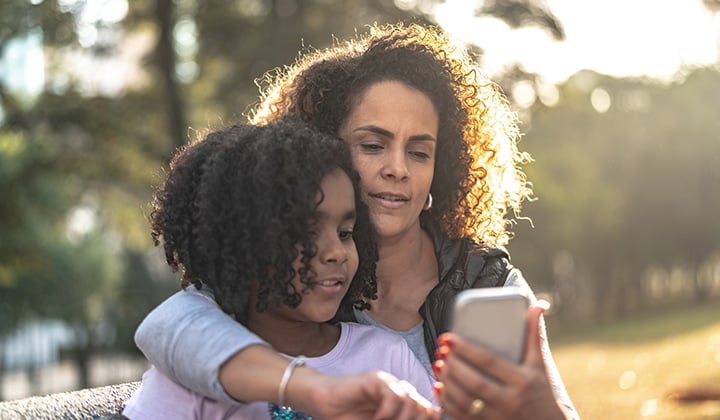
Allowing your child to join social media is a heavy decision many parents must make. It can feel like every kid has a phone, and almost every kid is on some type of social media. If you’ve ever asked yourself if you should let your child have social media accounts, here’s where to start.
Know the dangers of social media
Along with the risk of cyberbullying on social media and negative mental health effects (loneliness, depression, anxiety and suicide), there are also instances of human trafficking and pornography on almost every app. This information is not meant to scare you, but to help you realize that while technology and apps help us connect and create, it also brings many dangers. The best thing you can do to protect your child is to prepare and support them for the digital world by having open conversations and establishing a healthy approach to social media.
The right age for social media
The truth is there may be no “right” age for social media. Many social networking apps require children to be at least 13 years old to use their services, sometimes younger if they provide a “kids” version of the app. However, it’s important to note that younger children will often lie about their age to get around the restriction. Be involved and walk alongside them in their decision to get on social media. Try to think about where your child is developmentally, rather than age. Consider if they’ve developed good social skills, self-confidence and trustworthiness and if you’ve had open conversations about digital health.
Digital conversations
One of the best ways you can protect your children on social media, is by preparing them ahead of time. Talking about the online world means more than just discussing the social media account itself. It includes all the things a child could be exposed to online. Be sure to have talks with your child about:
- Your family’s core values (and what aren’t your values).
- Online safety, passwords, privacy and cyberbullying.
- Self-image, self-esteem and comparison.
- Pornography and sexting.
- Mental health and making short-term and long-term choices.
- Reputation and how nothing is deleted from the internet.
- How to handle uncomfortable situations and who to ask for help.
- Screentime limits and the importance of connecting offline.
Digital health
We would never put our child in a car without a seatbelt. Seatbelts are a safety measure we take to protect our children in vehicles. Think of digital health like you would physical health – there are check-ups, protective measures and important conversations to have as parents and trusted adults. Here are steps to work through to establish good digital health.
- Make a plan. Before setting up any social media account for your child, talk about what they hope to get from it. Is it only to connect with friends? Is it to have fun? Communicate with teammates? Look at the apps together. Talk about what types of accounts make you feel good and which ones don't. These types of talks will help you know what boundaries to set.
- Set limits. Agree to the limits of the social media accounts. Talk about:
- Kinds of accounts and public or private settings.
- Time spent scrolling.
- If direct messaging is allowed.
- How to handle comments.
- What types of pictures or videos are allowed to be posted.
- How to handle talking to strangers.
- Parental controls and monitoring. If you choose to have social media accounts, always use parental controls. A lot of parents are hesitant to put parental controls or filters on a kid’s device because they worry it shows a lack of trust. It’s not about trust, parental controls are a way to support and help. There are also parent control apps, like BARK, to help filter websites, detect and alert parents if serious situations are happening on their child’s social media account.
- Check-in. After allowing your child to set up an account, be sure to frequently check on how they are doing. Ask how they are feeling, what they are seeing, what they are dealing with online. By checking in with how time on social media affected them, you’ll be able to gauge if social media is still a good thing for your child.
Start slow
Like when you teach your kids to cook, we wouldn’t start them off with learning a 7-course meal. We might start with cereal. After mastering a skill, then they’d move on to something more challenging like a sandwich. This is how we must think about social media. Here are some options:
- Create a joint account and only use the app together.
- Only keep the social media accounts on your device.
- Set up the account so they are only viewing, instead of also posting.
Then, you can slowly increase the controls over time as they grow and learn.
Be ready to help
No matter what, nothing is 100% foolproof. We can put up the best protection available, but kids will experience something they’ll need your help with at some point. Keep the conversations frequent and natural so your kids will feel comfortable asking for your help with online situations.
Find more helpful information on parenting kids with social media in this Social Media Playbook from START and Smartphone Toolkit from START.
Related articles:
- Apps parents should know about: Where cyberbullying can happen
- Is my child being bullied?
- Parenting in the social media age

